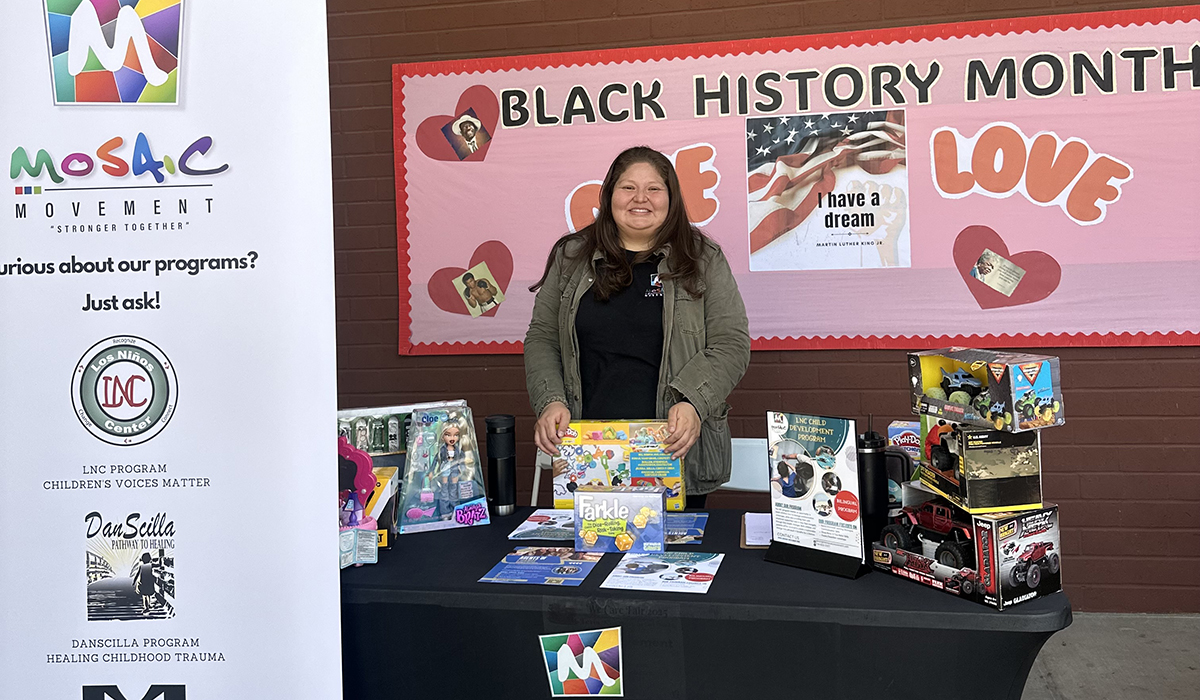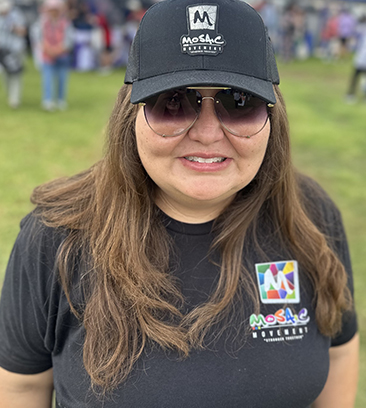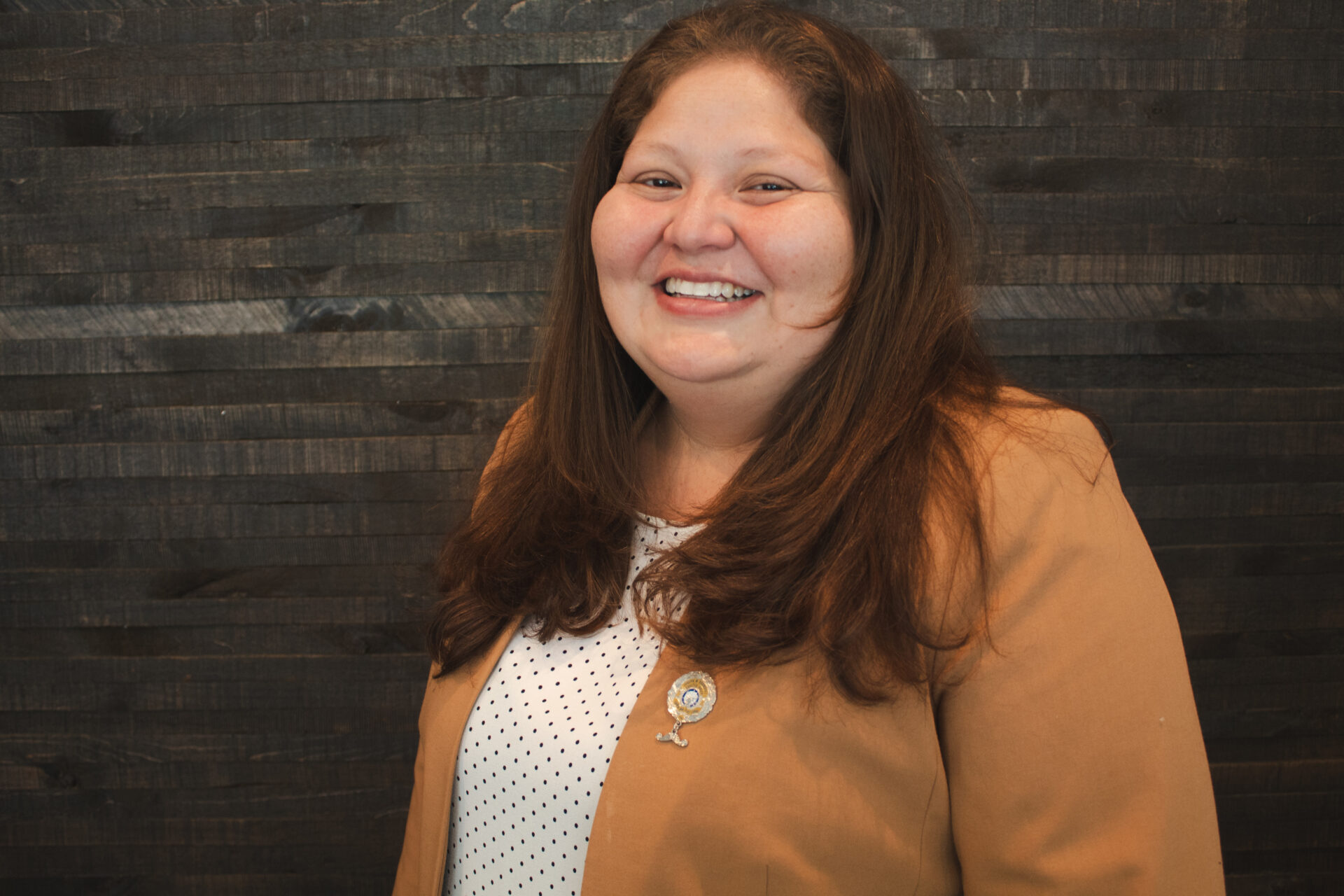The Architects of Hope Building Sanctuaries for Vulnerable Families

Meet Daily Point of Light Award honoree Yvette Williby. Read her story, and nominate an outstanding volunteer or family as a Daily Point of Light.
Yvette Williby embodies exceptional community leadership through her tireless dedication to underserved, abused and special needs children. As founder and chief executive officer of Mosaic Movement, Yvette dedicates a minimum of 60-80 hours per month to leading community-building initiatives that have raised thousands of dollars for critical care services. Her strategic leadership has built crucial community partnerships that multiply available resources, transforming the organization into a trusted establishment of empowerment, healing and unity. Yvette meticulously develops programs like the “Los Niños Center” for child development and prevention, “DanScilla” for trauma healing through therapy and “LUMRA” for survivors of sexual assault, creating a multilayered network of support.
Yvette’s proactively creates healing sanctuaries for vulnerable families, coordinating essential therapy and educational support, and connecting families with vital housing, medical care and mental health services. Her dedication to direct service and advocacy is remarkable; she coordinates essential goods deliveries for families in need, mentors youth in the “Agents of Change” leadership program and ensures families facing deportation replace fear with knowledge through “Know Your Rights” immigration workshops. Through collaborative, grassroots partnerships with local schools, faith-based organizations and businesses, Yvette has exponentially increased the support networks for those in greatest need.
The impact of this sustained effort is felt throughout the community. Her crisis response work has been a lifeline for families, and her youth programs equip the next generation with the skills to become confident, self-aware leaders. Yvette ensures every dollar and every minute of her time create this lasting change, not just a short-term band-aid. This is a foundational investment in the future, designed to create lasting transformation rather than temporary fixes to urgent issues.

Tell us about your volunteer role.
My volunteer role is the heart and hands behind Mosaic Movement—I’m the founder and CEO, but first and foremost, I’m a hands-on leader. For over 15 years, my life has revolved around two passions: teaching communication in the classroom and building community in neighborhoods from Fullerton to Santa Ana. What I was teaching in college—about interpersonal connection, conflict management and finding your voice—was exactly what was missing in the communities I was working in. I saw this gap firsthand, not from a distance, but sitting in living rooms, hearing families’ stories.
So, Mosaic Movement was born from that need. My master’s in communication isn’t just a degree on my wall; it’s the foundation of everything we do. It’s why our approach is trauma-informed and centered on the power of a person’s own voice.
And I don’t lead from an office. I’m in the trenches with our team and our community—personally leading workshops, hugging a crying parent and sitting on the floor with a child who’s finally starting to open up. I lead by example because I believe that’s how you build trust and show people they matter. Every backpack we hand out, every workshop we lead, every young mind we encourage—I’m there, because this isn’t just an organization to me. It’s my life’s work.
Why is this issue so important to you?
You know, this work is deeply personal for me. In my classroom, I taught communication theory and empowerment, and I spent over a decade researching community building and development. But I also saw the real-life cost when those things were missing. I reached a point where I had to become a neighbor who helped build change.
I made a conscious choice to get out of the stands and get into the game. I moved from the lecture hall to the living room, from analyzing problems to co-creating solutions. That’s when a group of fellow professors and I began our work in Fullerton, and I co-created the curriculum for an after-school program we implemented in two elementary schools. And what I’ve learned is that change isn’t a lightning bolt; it’s a slow, steady current. It’s in the “aha” moment when a child finds their voice, or when a parent, for the first time, feels equipped to advocate for their family.
That spark in one person’s eyes—that’s what fuels me. Because that one spark can light a fire in a family, and that fire can warm an entire community. This isn’t just what I do; it’s who I am. It’s the thread that connects my academic life to my purpose.
What inspired you to get started with this initiative?
What inspired Mosaic Movement was the powerful moment my two worlds collided: my life in academia and my life in the community. For over a decade in the classroom, my students entrusted me with their stories. Time and again, I’d hear a version of the same heartbreaking refrain: “If only someone had taught me how to handle this…” or “If only I’d had a safe space to process what I was going through… my life would look completely different today.”
That “if only” haunted me. And then, through my research and work, I wasn’t just collecting data; I was collecting stories that had never been heard. I saw brilliant, resilient kids, but I also saw the gangs waiting for them on the corner and the systems failing them. So, I moved from theory to action. We started testing solutions, working with teenagers on conflict management. And we saw it work. We saw kids transform right in front of us when they finally felt heard and equipped. But that success revealed a deeper truth: we couldn’t create lasting change for children without the support of their parents. We realized we had to coach the whole family.
We built upon that early work by intentionally weaving in parent coaching and mental health support. After all those years of listening, it became crystal clear: the community wasn’t asking for a savior; they were asking for a partner. They had the strength and the resilience. They just needed the tools. That’s when I knew I had to invest my whole self. Mosaic was born from that listening, from the courage of my students’ stories and from the unwavering belief that the community itself holds the blueprint for its own healing.
What are your long-term plans or goals for the organization?
My long-term vision is to see our Agents of Change and Los Ninos Center Child Development and Prevention programs woven directly into the fabric of our public school systems. I want this support to be a natural, accessible part of every child’s school day, not an extra service they have to seek out. Ultimately, we’re working toward a future where our three-pillar approach—awareness through education, supportive services for healing and resources for stability—is accessible to every family in our service areas, ensuring that no one is denied support because of their income, background or zip code. A big part of that is creating culturally safe spaces where immigrant families feel comfortable dismantling the taboos around mental wellness, an issue my research has shown is critical.
In practice, that means Mosaic Movement becomes a steadfast bridge in the community. We won’t just be a program; we’ll be the reliable connection point, guiding families to the right services, resources and educational pathways, and ensuring every single child gets the specific support they need.
What’s been the most rewarding part of your work?
Without a doubt, it’s the moment of trust. When a family lets you in. When they feel safe enough to share their struggles and their hopes with you. That’s a sacred space. In those moments, I’m not just a founder or a CEO; I’m a witness to their courage. The most powerful reward is seeing the transformation firsthand. It’s also in the quiet, steady victories: the look in a parent’s eyes after a Los Niños Center coaching session when they say, “I finally understand how to support my child,” or the text from an Agents of Change graduate who used our communication skills to navigate a conflict in school. And it’s in the collective joy at our community events, like seeing a child’s face light up when they receive a toy in December or a skateboard through our foster youth program. These moments are the living proof of our impact, and they fuel my belief in a better world.
What have you learned through your experiences volunteering?
This work has taught me one of the most humbling and important lessons of my life: we can’t fix everything, and there isn’t always a happy ending. There are stories and faces that stay with you, where you couldn’t reach the outcome you desperately hoped for. But my training in communication taught me a different way to see that. It showed me that our role isn’t to be the hero who swoops in with all the answers. This is why we have community liaisons embedded in cities from Anaheim to Costa Mesa. They ensure we are led by local voices. Our role is to be a steady, trustworthy partner in the struggle. This is why our philosophy is to meet families exactly where they are, without judgment. It’s never too early to offer support, and it’s certainly never too late to try.
And the most beautiful part is what you receive in return. When you stop seeing a community as “broken” and start seeing them as partners in healing, everything changes. They share their strength and their resilience with you. You carry a piece of their story with you, and it becomes a part of your own. That exchange, that human connection, is what fuels you. It’s what forever changes you and solidifies why you continue to do this work, even on the hardest days.

Why is it important for others to get involved with causes they care about?
I believe getting involved is what transforms us from witnesses into participants in shaping our world. It’s the critical leap from caring about a problem to taking care of it. It unlocks a sense of purpose that daily life often can’t provide. For me, this isn’t abstract. My research was in deeply difficult areas like sexual assault, where the statistics are chilling. We know that over 90% of the time, the perpetrator is someone known and trusted by the victim. Yet, these crimes are so often silenced, pushed under the rug by shame and fear.
Reading that research was one thing. But at Mosaic, when I sit with a survivor and see that statistic embodied in a person, the data becomes a story. The outrage becomes a responsibility. That’s why involvement is so vital. A volunteer might help us distribute groceries to a vulnerable family too afraid to leave their home, and in that act, they don’t just provide food—they deliver dignity and connection. Getting involved completes the circuit. It turns your knowledge and compassion into tangible action that tells someone, “You are not alone.” This is how we build what we call “collective self-sufficiency,” where everyone has a role to play.
It’s the engine that turns our academic understanding, our personal outrage and our innate compassion into tangible action that literally changes the course of someone’s life. We stop being bystanders to injustice and become agents of change.
Any advice for people who want to start volunteering?
My advice always starts with looking inward. Connect your actions to what you truly care about. Ask yourself not just what you’re passionate about, but why. What injustice stirs you? What story fuels you? That “why” will be your anchor on the tough days. And my biggest piece of advice is simple: get comfortable with being uncomfortable. Growth never happens inside your comfort zone. If you’re waiting for life to be less busy to start, you’ll be waiting forever. Serving can become your sanctuary within the chaos.
And please, start small. You don’t need to launch a nonprofit. Find your version of our work—If you love kids, go coach a Little League team. Maybe your “Agents of Change” is mentoring one teen, or your “Community Resource Fair” is helping at a local food drive. The key is to start. Be present, listen deeply and be consistent. And remember, the most powerful tool you have is your authentic self.
What do you want people to learn from your story?
Above all, be you. Every person and every group is different. If you’re not yourself, they will feel it. Just be you. You are enough. Sometimes, the most powerful thing you can do is simply show up, listen and make someone feel seen. This world wouldn’t be the same without your unique contribution, and your presence alone might be exactly what someone needs.
Do you want to make a difference in your community like Yvette? Find local volunteer opportunities.